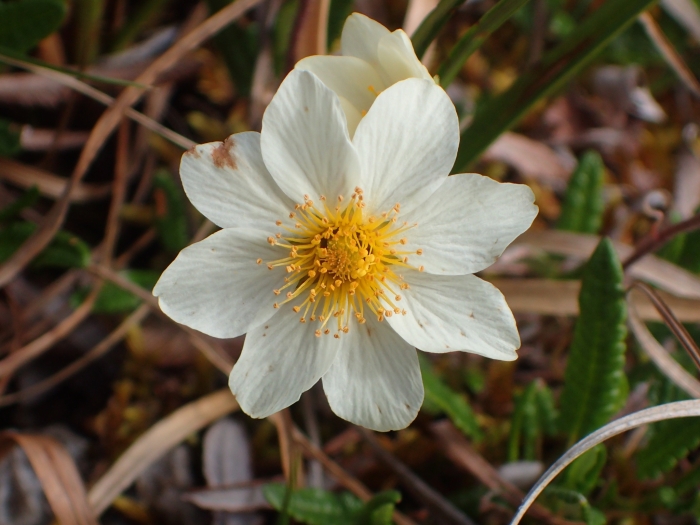Arctic Avens
(Dryas integrifolia)
Arctic Avens (Dryas integrifolia)
/
/

© Donald Hampton
CC BY-SA 4.0
Image By:
© Donald Hampton
Recorded By:
Copyright:
CC BY-SA 4.0
Copyright Notice:
Photo by: © Donald Hampton | License Type: CC BY-SA 4.0 | License URL: http://creativecommons.org/licenses/by-sa/4.0/ | Uploader: akdhampton | Publisher: iNaturalist |

























Estimated Native Range
Summary
Dryas integrifolia, commonly known as Arctic Avens, is a dwarf shrub that is well-adapted to the harsh conditions of its native tundra and rocky substrates in northern North America, including Alaska, Canada, and Greenland and Russian Far East. It typically forms prostrate mats up to 7 inches tall and features linear to lance-shaped leaves with distinctive silky hairs on the undersides, which help to insulate the plant in its cold environment. The flowers of Arctic Avens are notable for their white, yellow, or cream petals and are surrounded by numerous stamens, blooming in the brief Arctic summer and attracting pollinators. Following pollination, the plant produces plumelike fruits that aid in wind dispersal, a key adaptation for survival in its native habitat.
Arctic Avens is valued for its resilience and is often used in revegetation projects in Arctic and alpine regions due to its ability to stabilize soil and initiate ecological succession. In cultivation, it requires minimal maintenance, thriving in full sun to partial shade and preferring well-drained soils. While it is not commonly found in traditional gardens, it can be an interesting addition to rock gardens or alpine collections. Gardeners should note that, due to its adaptation to cold environments, it may not perform well in warmer climates.CC BY-SA 4.0
Arctic Avens is valued for its resilience and is often used in revegetation projects in Arctic and alpine regions due to its ability to stabilize soil and initiate ecological succession. In cultivation, it requires minimal maintenance, thriving in full sun to partial shade and preferring well-drained soils. While it is not commonly found in traditional gardens, it can be an interesting addition to rock gardens or alpine collections. Gardeners should note that, due to its adaptation to cold environments, it may not perform well in warmer climates.CC BY-SA 4.0
Plant Description
- Plant Type: Shrubs
- Height: 0.1-0.5 feet
- Width: 1-1.5 feet
- Growth Rate: Moderate
- Flower Color: White
- Flowering Season: Summer
- Leaf Retention: Evergreen
Growth Requirements
- Sun: Full Sun
- Water: Low
- Drainage: Fast
Common Uses
Erosion Control, Low Maintenance, Rock Garden, Showy Flowers
Natural Habitat
Native to tundra and rocky substrates in northern North America, including Alaska, Canada, and Greenland
Other Names
Common Names: Mountain Avens , Entire-Leaved Mountain Avens , Entire-Leaved White Mountain Avens , White Dryas
Scientific Names: Dryas integrifolia , Dryas integrifolia f. integrifolia , Dryas integrifolia var. integrifolia
GBIF Accepted Name: